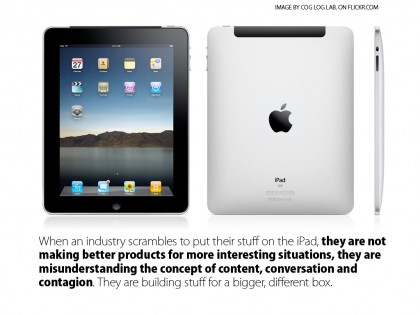The iPad might be an impressive piece of technical hardware, but it’s just a box
. Innovating for boxes, instead of people, will just help us create more tools, not change behaviors. There is a lack of interest in figuring out the human component, and an over exaggerated focus on platforms.
After reading this PSFK article on how the social mechanics of Chatroulette inspired Daniel Vydra to rebuild an application to serve random news articles from the New York Times, and then this comment by Cory Doctorow on Boing Boing (Shared by @mikearauz)
. It seems obvious that the innovation we are searching for is found through the understanding of human behavior; how to make them better, improve or create additions to them
never ormen aged 40 and above, the highest proportion, consider How to get viagra.
.
But, then seeing how the brilliant ideas behind this breathtaking prototype, being re-purposed for the iPad, end up with nothing more than an obvious HTML 2.0 concept here, it seems that the ambitions are more connected with having a presence on a box than actually bettering behaviors.
It’s frustrating to acknowledge that even though innovation and brilliant ideas come from understanding people and situations, we are overly focused on boxes, engineering, developers and electrical circuits.
As Cory Doctorow of Boing Boing writes in his comment on the iPad:
- “The real issue isn’t the capabilities of the piece of plastic you unwrap today, but the technical and social infrastructure that accompanies it.”
When an industry scrambles to put their stuff on the iPad, they are not making better products for more interesting situations, they are misunderstanding the concept of content, conversation and contagion. They are building stuff for a bigger, different box.

The changes the iPad and tablets alike could bring to people is massive, but then we need to explore the human potential, not the box.
Doctorow’s example on Marvel’s iPad application is more descriptive than anything:
- “I mean, look at that Marvel app (just look at it). I was a comic-book kid, and I’m a comic-book grownup, and the thing that made comics for me was sharing them
. If there was ever a medium that relied on kids swapping their purchases around to build an audience, it was comics. And the used market for comics! It was — and is — huge, and vital. I can’t even count how many times I’ve gone spelunking in the used comic-bins at a great and musty store to find back issues that I’d missed, or sample new titles on the cheap.
…
So what does Marvel do to “enhance” its comics? They take away the right to give, sell or loan your comics. What an improvement. Way to take the joyous, marvellous sharing and bonding experience of comic reading and turn it into a passive, lonely undertaking that isolates, rather than unites. Nice one, Misney.”
The iPad is not the problem here, it’s a symptom defining a larger problem; the fact that we still haven’t figured out that if we are to build better and smarter solutions for our citizens, members, partners, participants, readers or even customers, then the piece of hardware we need to be looking at is the human brain – and the infrastructure surrounding it – not a piece of unwrapped plastic.


In the war of words between the the publishers hailing their new overlord and the evangelist for Open Everything, I think we finally are getting to the interesting middle ground with the questions that really matter. Thanks, Helge!
Hi Johannes, thanx :)